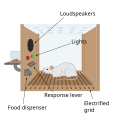Classical conditioning (also respondent conditioning and Pavlovian conditioning) is a behavioral procedure in which a biologically potent stimulus (e... 65 KB (8,707 words) - 23:57, 26 April 2024 |
Operant conditioning, also called instrumental conditioning, is a learning process where voluntary behaviors are modified by association with the addition... 67 KB (8,836 words) - 14:12, 9 April 2024 |
Eyeblink conditioning, classical conditioning involving pairing of a stimulus with an eyeblink-eliciting stimulus Fear conditioning, classical conditioning involving... 2 KB (320 words) - 17:36, 9 October 2021 |
 | can be used to study both operant conditioning and classical conditioning. Skinner created the operant conditioning chamber as a variation of the puzzle... 16 KB (1,801 words) - 10:43, 6 April 2024 |
 | Ivan Pavlov (section Classical conditioning) experimental neurologist and physiologist known for his discovery of classical conditioning through his experiments with dogs. Pavlov was born the first of... 37 KB (4,110 words) - 17:01, 21 April 2024 |
associations is the basis for learning. This learning is seen in classical and operant conditioning.[citation needed] Edward Thorndike did research in this area... 18 KB (2,446 words) - 07:10, 19 December 2023 |
 | Learning (section Classical conditioning) example, learning may occur as a result of habituation, or classical conditioning, operant conditioning or as a result of more complex activities such as play... 79 KB (9,983 words) - 16:57, 25 April 2024 |
 | In classical conditioning, second-order conditioning or higher-order conditioning is a form of learning in which a stimulus is first made meaningful or... 5 KB (668 words) - 16:20, 16 April 2023 |
Bedwetting alarm (section Classical conditioning) This suggests that the conditioning treatment may follow the operant avoidance conditioning rather than the classical conditioning pattern. In addition... 12 KB (1,718 words) - 19:27, 6 March 2024 |

